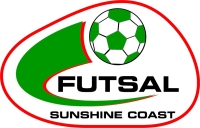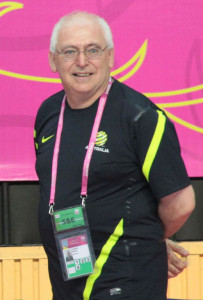Futsalroos Coach is coming to Sunny Coast
Futsalroos Coach is coming to the Sunshine Coast
Head Coach of the Australian Men's Futsal Team known as the Futsalroos is making his way to the Sunshine Coast on Sunday 7th December to run coaching sessions for our local Sunny Coast Coaches and Players.
Rob's technical and tactical knowledge is invaluable and it will be an honour having him here on the Sunshine Coast to share his experience with our local Coaches.
Some of our local players will also benefit from his training sessions which will be perfect timing prior to representing Queensland and participating in the FFA National Futsal Championships in January 2015.
Rob possesses a wealth of knowledge of both the domestic and international futsal scene. He coaches the Dural Warriors Open Men's Team in the Nsw Futsal Premier League and he attended the 2012 Futsal World Cup in Thailand as the Assistant Coach of the Futsalroos.
Only "FFA Accredited Futsal Coaches" will be invited to attend sessions.
Players attending the sessions will by via invitation only.
Shown below is a recent interview courtesy of Futsal 4 All,
Interview with the Australian Men’s Futsal Coach Robert Varela
Question 1: Were you surprised when you were appointed by the FFA to be the National Men’s Coach?
Rob: Having been involved in the Futsalroos set up since 2010 and given that FFA were likely to continue with a local coach I was hoping that my previous performance would be taken into consideration.
Question 2: Why do you think you were picked over other contenders?
Rob: I believe that FFA were aiming to have continuity from the great work that Steve Knight had done the previous 4 years and that my involvement as his assistant would help in achieving that continuity.
Question 3: You asked Simon Keith to be your Assistant Coach. Why?
Rob: Simon has had an excellent playing career at the international level; it is that experience, which I do not have, that provides a different point of view in the way he sees the game, he gives me the players’ perspective.
Also Simon is starting to forge a very promising coaching career; he has had a good deal of success with young squads both in the NSW Premier League as well as the FLeague.
I believe that all those factors will enable Simon to earn the players’ respect very quickly
Question 4: What are the challenges coaching the Futsalroos?
Rob: There are several areas that affect the final performance of the team: player availability for both tours and training sessions, is perhaps the main one; the amount of training that we can have; the inability to be able to scout across the country and lack of international competition outside of the tournaments that we attend. Also there is the question of coaching infrastructure which affects the development and futsal education of players. Having said that, it is important that we do not dwell on the shortcomings but we just get on with the job of building a team that is respected by the Futsal community.
Question 5: Are there differences in your approach to coaching than Stephen Knight’s?
Rob: Steve did a magnificent job as Futsalroos coach: taking the team to the 2012 World Cup and numerous other Q/F and S/F appearances in major continental championships is a clear testament to that. I would like to think that I can build on that very strong base that Steve created.
Perhaps the main differences would be that I favour a little more structured approach to the game; I believe that all the defensive work that Steve put into the team these last few years affords me the chance to spend a little more time in working the more attacking facets of the game.
Question 6: When did you start to be involved in Futsal?
Rob: Back in 1984 having just finished a successful season coaching Melita Eagles U/12 team in the then NSW Youth League, we decided to have a crack at this “new” indoor soccer game in the off season.
Question 7: What was your first Futsal coaching experience?
Rob: We entered what was the only 12 Boys competition in Sydney at the time held at the Revesby YMCA with some of the Melita boys and after losing the first game the boys won every other game including the GF. I knew very little about the game so we concentrated in defending tightly and keeping possession until an opportunity to shoot came about…
Even though I had no idea how to coach “indoor” I was hooked in the sport and have never looked back.
Question 8: Which was your first international tour as a Coach?
Rob: An U/16 Australian team to Argentina and Uruguay as Assistant to Brian Keightley from Queensland in November 1988
Question 9: Can you explain your coaching preferences and philosophies?
Rob: Most successful teams are renowned for their defensive capabilities. I believe that if you concede 2 goals or less per game you will be successful most of the time. Good defending dictates the pattern of a match and a lot of your attack flows from there as statistically, at least 50% of the goals are scored in transition play, and you can’t create transition play if you defend poorly.
Question 10: What quality or qualities do you look for in your players?
Rob: I will preempt my answer by saying that some of the qualities that make a player “successful” in domestic competitions are not necessarily what is needed at international level.
Ideally what we look for is a high level of technical ability, a high degree of mobility and from a tactical point of view the ability to learn new concepts quickly and implement them at the right times. Obviously a player with all those attributes is rare, especially in our current playing environment.
Decision making under pressure and at speed is vital at all levels of Futsal but most importantly at the highest level and that is the quality that separates the good from the very good players.
Question 11: How important is hard work and repetition in your training?
Rob: Hard work is a given, a player that is not prepared to work hard is of very little value to the team. In terms of repetition, Futsal being such fluid, ever changing game, it is difficult to recreate all the possible situations at training. We aim to give the players a blue print, guidelines if you like, of how we want to play and then we try and recreate the most common situations at training and show them the most common options they could take and see whether the players make the correct decision at the time.
Question 12: You have picked several players from your Dural Warriors team. Do you think this may be a problem from an outside perspective?
Rob: Undoubtedly so.
Let me begin by saying that in my initial conversation with Luke Casserley, Head of National Performance, when the position was offered to me, I offered to stand down from my club commitments. FFA’s response was that given that the position was not full time and that it would not take more than a few weeks of my time each year they did not see the need for me to do that.
It is frustrating to see that to some people player selections appear to be based on club and/or state allegiance. I can quite easily accept that people may think that other players are better than some of those selected in the current squad; everyone is entitled to their own opinion, whether it is based on facts or perception, but when there are accusations of bias made by people who in some cases do not have the courtesy to put their own name to the comments it becomes an attack on my integrity.
Javier Lozano, Futsal World Cup winning coach in 2000 and 2004, current Spanish National Coach Venancio Lopez and many other coaches have been criticized for their selections as well. Obviously I am not comparing myself to these two great coaches but the point is, it goes with the territory…
Question 13: Do you have a favorite formation that you like to use? If so, why?
Rob: Formations are just a starting point. Regardless of whether “you play 2×2, 3×1 or 4×0” once a player plays a pass and makes a run the “formation” is gone…
I prefer to use patterns of play, employing either attacking or defensive fundamentals, dominating space in defence or using supporting mechanisms to maintain possession.
Question 14: How have players changed in the years since you first began coaching and how have coaches changed in that time?
Rob: The whole game has changed dramatically since I initially became involved in the mid 80’s: the laws of the game are different, the size and weight of the ball are different, the dimensions of the court are generally different and all that obviously has had a profound effect on how the game is played, specially at the elite level in most countries.
The game is faster now so players have to adapt physically to the new demands; there are few “specialists” nowadays, players need to be able to produce an all-court game in the modern game.
It is very important that local coaches realize that the game continues to evolve and that they continue to educate and equip themselves to keep up with the changes. Some have, but sadly, others have not.
Question 15: Do you think Futsal can be a sport in its own right, or do you think it will always be seen by the football community as a training tool for football?
Rob: That is up to the Futsal purists. If we continue to “sell” the sport just as a training tool for football, that will continue to be the perception of the majority. The advantage of that approach is that it could get people involved that in general would not do so; the other side of the coin is that it could very well hinder Futsal status as a sport in its own right. For Futsal to be taken seriously as a sport in its own right, it must be able to offer a development and career path similar to other major sports, that is an entirely different issue in itself.
Question 16: Do you think other non FFA affiliated Futsal bodies in Australia have done more good or damage to Futsal in Australia?
Rob: There are many different aspects to this issue. Futsal is a sport that lends itself quite easily for private operators to be involved in terms of running local competitions etc and a lot of them do a very good job of it and have the best interest of the sport at heart.
For the good of the sport it is important that there is a unified, common approach that encompasses all the different stake holders; for example, in an ideal world, private operators would run local, domestic competitions and the state federations with the support of the parent body would look after the representative, elite component of the sport including coaching education, player development and refereeing matters.
Question 17: What do you think Futsal in Australia will look like in the future?
Rob: Futsal has the potential to be the best indoor sport in the country, and that has been the case since I became involved many years ago: it is exciting to play and watch, an ideal TV sport also.
Over the last 30 years Futsal has survived mediocre, bad and non-existing administration, self-interests and personal agendas; it has proved itself to be a very resilient sport.
There is an old saying that states that if one keeps doing the same things all the time one cannot expect different results. Futsal is at the crossroad of its existence; all the different parties need to come together and work for the development and betterment of the sport putting aside personal agendas.
The sport needs more leadership, support and involvement from the head body otherwise it will remain, at best, fragmented if not non-existing all together.
Question 18: What do you think of Women’s futsal and do you think FFA will have a National Women’s team soon?
Rob: The girls put as much effort and show as much passion for the sport as the boys do, so they should be afforded the same opportunities as their male counterparts.
I am not privy as to FFA’s plans for a National Women’s team but I strongly believe that there is no reason why there should not be one, especially given that AFC has recently announced a timetable for a Women’s Championship.
Question 19: What do you think of the F League and will it ever become a fully professional league?
Rob: The timing and scheduling of the league is vital if it is ever going to become a viable, professional competition that offers the elite players a definite career path and a goal for the young junior players to aim at.
One way to raise the playing standards is to ensure that the best players are taking part on a weekly basis; a summer competition will go a long way to ensure that this happens as it would not be in competition with winter football. At this stage it would be unrealistic to expect leading ALeague players to be enticed across so the main player base would come from State based football competitions, usually played in winter and elite Futsal specialists.
To make the league attractive to sponsors TV coverage and the participation of teams from every state is essential.
Question 20: Do you think Australian Futsal has improved in the last 10 years compared to the rest of Asia?
Rob: We have been “treading water” in the domestic scene and overachieving in the international stage.
Our player base at the elite level has not increased in term of quality and players’ registration at the social/local level has been haphazard at best.
The coaching standards have, in general terms, stagnated and the refereeing standards need an overall improvement.
I know that many countries across Asia have devoted more resources than us to Futsal but I am more interested on what we need do to improve the game here.
Question 21: Which teams do you consider the main threat to be at the 2014 Asean Futsal Championships in September and why?
Rob: We are going to the tournament with the mentality that the next team we play is our biggest threat. Obviously the rankings tell you that Thailand, Vietnam, Malaysia and Indonesia would, on paper, present the biggest difficulties for us, but we can’t take any team lightly.
Those teams I have mentioned are very good athletically and technically; some of them have the use of some of the best coaches in the world so we know that they will be tactically very sophisticated.
Question 22: What target have you set to achieve for the team in this Championship?
Rob: We can’t control results, but we can control the way we want to play, so we have set ourselves performance goals.
We want to become a highly respected, very hard team to beat in the area.
Question 23: How do you rate the chances of Australia qualifying for the 2016 FIFA Futsal World Cup?
Rob: There are so many factors involved in qualifying for a World Cup, some we can control and some we can’t.
We need to develop a larger group of players able to compete for places in the final squad; we need to raise the standard and alter the style of play in the elite local competitions.
All this will need the cooperation and effort of elite local coaches. With a view to this we are in the midst of putting together processes to liaise and consult with elite coaches across the country to put steps in place to achieve the two goals mentioned above.
Question 24: Who is the best Futsal Coach you have met?
Rob: I have been fortunate to have met and seen some excellent coaches at work and I have also had the chance to gain access to some great coaching material. I have learnt a lot from many different coaches from overseas and local ones, so it’s difficult to single anyone in particular.
I am happy to count two excellent coaches as Miguel Rodrigo and Pulpis as friends and mentors. I had the opportunity to spend 3 weeks with them in Spain a few years ago and that was a truly amazing experience.
Question 25: What are your interests outside of Futsal?
Rob: I am an avid reader and love spending time with my 3 kids and baby grandson, although, ironically, my involvement with Futsal keeps me away from them a fair bit.
Thank you.











Comments
Comment Guidelines: The SportsTG Network is made up of players, families and passionate sports followers like you who have a strong opinion about sport. That's great - we want you to have your say and share your thoughts with the world. However, we have a few rules that you must follow to keep it fun for all. Please don't be rude, abusive, swear or vilify others. Apart from some pretty serious sport sanctions, we also can ban you and report you if things get out of hand. So play fair and have fun, and thanks for your contribution.